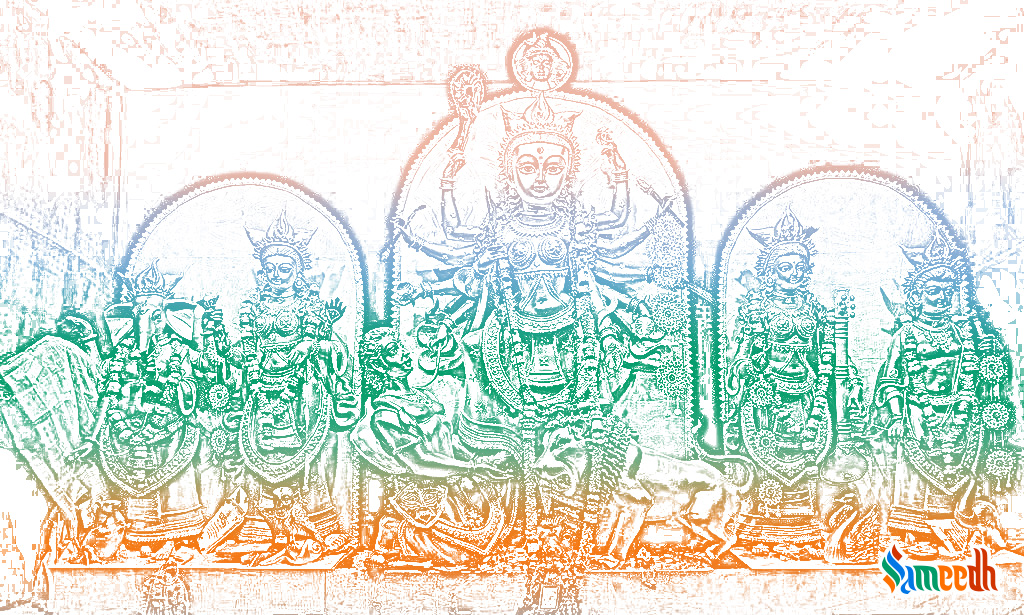The relevance of worshipping idols in Hinduism

Goddess Durga and a pantheon of other gods and goddesses; Image source: Subhrajyoti
Idolatry is a form of worship wherein devotees associate gods and goddesses with sculptures, icons, statues or idols which are believed to look like the former or represent them. Such idols or pictures are known as Murti or Pratima in Hinduism. Many religions are said to believe that the supreme powers should not have any concrete form or shape. But idol worship is considered common in Hinduism as according to this religion, divine energies are present in every single object as it is all a creation of the almighty.
Scientifically, each and every object is a part of the cosmos and contains certain energies. A lump of clay can be converted into a vase and the same chunk can be used to create a dish. Similarly, with different vibrations and frequencies of energy, any element can be used to create various things. Idols too are nothing but concrete embodiments of deities infused with powerful energies.
Idolism and Hinduism
Idols in Hinduism are shown as omnipotent beings with a mixture of certain human-like features and god-like extensions of it. These manifestations of god instils the sense that they are similar to human beings but with a tweak of mystic physical characteristics. This makes it comfortable for devotees to both connect with the idols and worship them for their greatness. Although earlier, to offer devotion to gods, one took the meditative and spiritual route. But in today’s fast paced life, offering prayers through an idol can help empower followers’ faith. Devotees can channelize their energies linearly towards one entity. The physical image of god right in front of one can automatically evoke faith and encourages the follower to stay put for a while and try to communicate by praising the eminence of god. Worshipping idols is known to bring success, wealth, prosperity, happiness, health and peace into one’s life.
Hindus don’t always approach these idols as gods themselves, the Murtis are hailed as physical, tangible symbols of the almighty.
How to worship Idols
Idols are generally made up of marble, clay, metals such as gold, silver, bronze, granite etc but as mentioned, one can create an idol out of stone too by focusing the right energies into it. These Murtis, whether in temples or homes, are regularly worshipped with prayers and mantra chanting. Idols can be dressed with garments, garlands and jewellery. Conducting an Arti after bathing the idol, applying Tika, lighting lamps, offering incense sticks, prasad or sweet dishes for god is deemed auspicious and is suggested to be done regularly. The entire atmosphere where an idol is present is deemed to be holy and positive due to the peaceful vibrations it emits. Places of worship are designed such that the surroundings are pure and enhance the quality of meditative and worshipping practices.
Idols of gods such as Vishnu, Shiv, Ganesh, Saraswati, Brahma, Durga, Ram, Hanuman are widely worshipped in the form of statues, icons, lingam and photos. Several features and attributes of these deities are elaborately explained in the Hindu religious scriptures such as Vedas and Puranas, from which the depiction of idols is curated and made.
Annual idol worship
Every year on the festival of Ganesh Chaturthi, birth of Ganesh, Hindus bring home Murtis of the deity and worship it for 3, 5, 7, 9 or 11 days. They perform Arti twice a day, distribute sweets, adorn the idol with garlands, new clothes, apply Tilak, chant songs of prayers and celebrate the occasion with ample grandeur. After a set number of days, the Murti, made up of clay, is immersed into the sea. This annual pooja or religious ritual serves as a reminder of divinity.